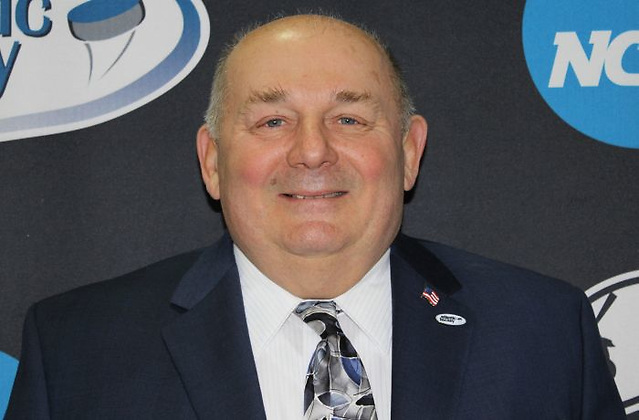
Last April, Atlantic Hockey commissioner Bob DeGregorio announced that this season, his 20th, would be his last at the helm.
He will also retire as commissioner of the College Hockey America women’s conference, which he has led for 13 years.
At age 76, and after 40 years in college athletics, DeGregorio said that it was time.
“I’ve been blessed to work with great people,” said DeGregorio. “Athletic directors, coaches, and administrators who had the best interests of college hockey in mind. We didn’t always agree on everything, but we all wanted the same thing.”
DeGregorio is the league’s first and only commissioner, which started out as part of the Metro Atlantic Conference in 1998 and transitioned to the hockey-only AHA in 2003.
During his tenure, the league’s profile has changed dramatically, from the list of members (two schools dropped hockey, two more left for other conferences, and four schools were added) to the number of scholarships (from 11 to 18) to the construction of three on-campus areas and the upgrades in facilities at virtually every other school.
When asked for some of the major challenges he’s faced in the past 20 seasons, DeDregorio pointed to two that stood out.
“The formation of the league,” he said. “And, of course, COVID.
“Initially, getting the original schools together was a challenge. Deciding on budgets, scholarships, and bylaws.
“And COVID was the worst experience in my career. I’m so proud of how we all managed it, but it was tough. “We were dealing with different rules in the various counties and states that changed all the time. We had a conference call every Sunday to review the changes and then see which teams were able to play based on that and their testing status. We were shuffling the deck and making the schedule on the fly. Everyone rallied, unbelievably, to make sure that we could play games and have a tournament.”
DeGregorio says that two expansions, the addition of Air Force and Rochester Institute of Technology in 2006 and Niagara and Robert Morris in 2010, were crucial to the conference’s profile.
“They made the league better,” he said. “They elevated what we were trying to do.”
DeGregorio says that he’ll always remember the spirit of cooperation that he felt among the conference’s athletic directors and coaches.
“Some of the changes, like increasing scholarships, which I think is very important to our league being on a level playing field, didn’t benefit everyone,” he said. “But all the schools supported it. Air Force and Army can’t offer scholarships and RIT couldn’t at the time, either. But they stepped up because they knew it would make the league better.”
The commissioner didn’t always get his way. A recent example was the new playoff format, which leaves two teams out of the postseason.
“I think with an unbalanced schedule, it’s not right (to exclude teams),” he said. “I hope that gets reversed at some point.”
When asked what he’d like to see happen under a new commissioner, DeGregorio mentioned a couple of things.
“Expansion to 12 teams,” he said. “And getting another (Atlantic Hockey) team into the NCAA tournament. I think both will happen, it’s just a matter of when. Twelve teams gives you the opportunity for a balanced schedule and postseason.”
DeGregorio isn’t a fan of the transfer portal and hopes that its emphasis decreases in the coming years.
“It’s basically free agency,” he said. “(The portal) has its purpose in some situations to improve the experience for a player, but I think as it exists today, it’s not good for the sport.”
So while there’s a feeling of accomplishment for DeGregorio, there’s also some unfinished business that part of him would still like to tackle.
“Sometimes I wish instead of 76 I was 27,” he said. “So I could do it all over again.”
Century Club
On Jan. 5, Sacred Heart forward Austin Magera scored his 100th career point, a goal, in a 5-0 win against Army West Point.
Currently, the Century Club in Atlantic Hockey consists of just Magera. This is despite several players, including Magera, getting an extra year of eligibility due to Covid.
A few other players are approaching the 100-point mark, including Magera’s teammates Ryan Steele (89) and Braeden Tuck (83).


